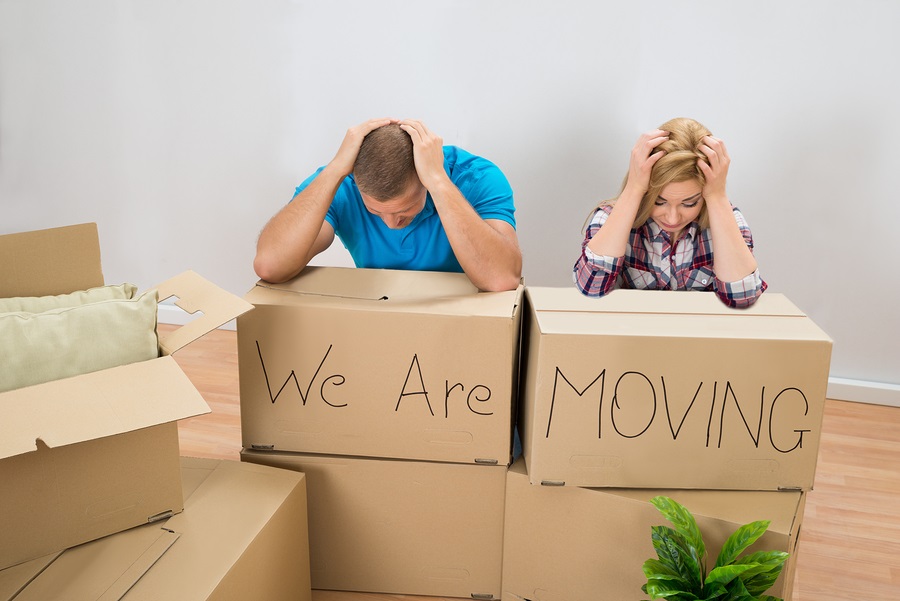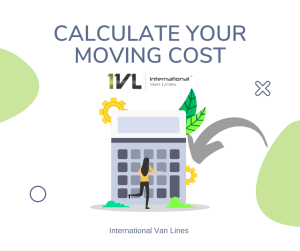8 Tips to Help You Cope with the Stress of Moving

Moving is never easy. But that doesn’t mean it’s an inherently miserable and exhausting experience for everyone. People respond to moving in different ways.
Some people, for example, are absolutely thrilled by the prospect of moving. It’s something they actually enjoy (shudder!). They’ve planned and dreamed about it for ages, and now that they’re finally taking the plunge they’re over the moon about it. They can’t wait. Sitting in traffic, waiting in line at the DMV, listening to the news—it doesn’t matter. Thinking about their upcoming move brings a smile to their faces.
For others, moving tends to be much more of a struggle—usually because it’s not something they want to do, but rather something they have to do.
Read Here: Tips to move a new city
Maybe they’ve been transferred by their employer or have a new job and have six weeks to make all the necessary arrangements. Maybe they need to downsize in their old age, or as a result of financial strain. Or maybe they realize, slightly late in the day, that they need more space for a growing family—or have to care for elderly relatives earlier than they expected. In these cases, there’s less daydreaming and a lot more moving stress and moving anxiety—and that’s a perfectly natural response to the need to move to a new location on the fly, without really wanting to.
And even those who relish the idea of moving house tend to focus on the end result–not the process itself. They block out, at least temporarily, all of the stressful things that moving involves. In the end though, even those keen to move find themselves burdened by stress, worry, annoyance, extreme anxiety, and—in some cases—exhaustion and depression.
So it’s important to consider the toll, on both mental and physical health, that moving can impose—and ways to avoid that toll, or at least bounce back from it.
Below we offer 8 tips to help you cope with the stress of moving. Not all of these strategies work for everyone (which makes sense), but, without question, anyone facing an imminent move—who’s beginning to feel anxious—is bound to find two or three of these recommendations effective. I know that I found almost all of them effective when I moved. They helped me deal with the stress of moving and allowed me to get settled in my new environment quickly.
So let’s go!
Tip #1: Expect Some Emotional Upset

There’s no getting around the fact that moving is stressful. It’s a big change. Relocating to a new area means leaving behind familiar surroundings and routines as well as all your friends and colleagues—and in many cases family members.
This sense of dislocation, sometimes referred to as relocation depression, can trigger a whole host of emotions, ranging from anxiety and general sadness to all-out panic and even grief. The first step to moving past these negative emotions is to recognize and accept the fact that things are going to be tough for a while.
Read Here: Moving Yourself vs Hiring a Mover
In other words, it’s totally normal to feel a bit down after a move. In fact, relocation depression and anxiety are more common than most of us realize. Studies indicate clearly that the stress of moving has a negative impact on most people’s mental health, even if—on the surface of things—they’re pleased with the way the move went and they’re completely happy with their new home.
Why do we tend to feel down after a move?
First of all, human beings are creatures of habit. Change—even if it’s a welcome change—places strain on the system. We start feeling like a fish out of water, we’re not sure what we can count on, and this produces a vague sense of loss and angst. We feel out-of-sorts.
To understand and come to terms with the fact that for days, weeks, or maybe even months after your move, you’re likely to feel a bit fraught. You won’t feel quite right. And that’s OK. You’re human, and both your body and your mind are trying to deal with radical change. Don’t fight it—accept it. Just hold on tight. It’ll pass.
Tip #2: Consider Getting a Little Professional Help

For some people – not all, but some – moving is completely overwhelming and actually impairs their ability to function in other areas of their lives. If this is the case for you or someone you know, never be averse to seeking out a little professional help.
Therapists are well-versed in the stresses and strains involved in moving, and they have a variety of tools that they can draw on to help you – everything from talk therapy and CBT to relaxation techniques and (if necessary) medication. Indeed, for most therapists and counselors, moving-related stress is a very common “garden variety” ailment that they see ALL THE TIME. In other words, they know how to treat it.
Read Here: 8 Packing tips you will remember for life
In addition, there are a plethora of online resources and support groups that can help you navigate through many of the emotional challenges involved in moving. Some people actually find it incredibly helpful to participate in online forums like Reddit and Quora and chat with others in the same boat as them, tapping them for wisdom. It’s incredibly comforting when you’re faced with a stressful event in your life to talk to someone else going through exactly the same thing.
The right therapist, of course, can work wonders. Never be afraid to take a step forward if you think it’ll help you end up in a better place. Talk to someone who can relate to what you’re going through and, crucially, provide you with some tools to help you cope. If you’re suffering, don’t suffer alone. There’s no need to do so.
Tip #3: Establish New Routines as Quickly as Possible

Again, human beings are creatures of habit, and one of the best ways of dealing with the emotional dislocation that comes with moving is to establish new routines as quickly as possible.
The truth is, that our daily patterns of behavior provide us with a sense of stability and control.
Even those who think of themselves as “spontaneous” and “free-spirited” tend to stick to certain life patterns that afford them a sense of comfort and security. When we move to a new place, these life patterns are shattered for a period of time, and we have to construct new ones in their place. Some people can do this in no time at all, making new friends as they do so, but for others, the process takes a lot longer.
Read Here: Top 10 Move In (Not Moving!) Tips
This adjustment period can definitely be challenging for some and can also give rise to anxiety and emotional discomfort. But it’s definitely possible to shorten the period of adjustment – and the duration of any suffering – by laying down new routines quickly. If you’re a walker, runner, or cyclist, for example, get out there and establish new routes that you like. Pick your gym days.
Check out a few different supermarkets within a few days of arriving and figure out the quickest and easiest routes to get to them. If you have to commute for work, explore different routes to get there – just to get a feel for things. Do this consciously. In the process, you’re learning what works for you and what doesn’t, and what feels good and what doesn’t, and you’re also learning a ton about your new community, the people who live in it, and the way it’s organized.
The same rule applies to all sorts of little things, like meal prep, workouts, sleep habits, mail collection, and parking. Almost immediately, set aside a particular day of the week for a video call with the whole family (if some of them can’t visit in person), and stick to that day. Just lay down some preferred ways of doing things as early as possible, and, as long as things go well, stick with those days and those patterns. Doing so will quickly impart a sense of confidence and control and the rest of your life can start to revolve around these markers–or foundational routines–you’ve established. You’ll be surprised at how much calmer you feel as a result.
Tip #4: Pre-Plan and Organize as Much as Possible

This may seem like common sense, but it’s amazing how many people’s idea of “pre-planning” is to make sure they get the right day off from work for their move!
Also, a lot of people, prior to a big move, keep all the details of what’s going to happen upstairs in their big, beautiful brain – and nowhere else – mimicking, I’m guessing, the way they approach work deadlines, family obligations, and holiday planning. This is a big mistake.
Even a modest move involving a single person has so many moving parts that it’s absolutely vital to put together a detailed moving plan that includes timelines, deadlines, and lists of key tasks. Even if you’re great at keeping everything that needs to be done in your noodle, embrace the concept of the checklist. You’ll be so thankful you did—during your move and especially afterward.
Read Here: Tips to pick the best moving company
A checklist delivers a real sense of calm and demonstrates, to yourself as much as to anybody else, that you’ve got things under control.
Also, remember to break the stuff you have to do into smaller components so that you can tackle each task with greater confidence. For example, even though you have to notify utilities like electricity, water, Internet, and cable, about your move, there’s nothing that says you have to call all of them on the same day. Call one of the companies when you have a few minutes free, then call another on a different day. Tell yourself that whenever you have 15-20 minutes free, you’re going to use that time to contact one of the providers or your list – or maybe accomplish some other task.
Use the checklist to record your progress. Try to contact all of the providers at least a month before you move to make sure that services are disconnected at your old residence and restarted at your new one on the right dates. But like everything else on your checklist, create small, manageable requirements that you can take care of quickly without feeling overwhelmed. This will do wonders for your mental health and your confidence.
Know More Here: 8 Questions to ask long distance mover when planning a move
Regarding your address, let the post office know your plans and where you’ll be moving to. Let your bank, credit card companies, and anybody else who sends you regular mail – your employer in particular, and any other service providers – know what your new address will soon be. Again, there’s no need to do all of this at once. Take your time – but do start early!
Also, make a list of all the rooms in your current residence and a corresponding list of rooms in your new residence. This is your “moving map”—one that will prove invaluable as you pack and organize. Keep it handy and treasure it.
Assign a number to each one of these rooms or – if you prefer – a color. This approach is simple but incredibly effective. It becomes far easier to get things out of your old home and into your new home if all you have to do is think about numbers or colors. When you’re tired and your brain is on the verge of shutting down, all you have to do is think “#1” or “blue” and you know where to dump stuff. Easy-peasy.
Speaking of easy, start packing the easy stuff first – the stuff you use least. Follow this pattern all the way through to moving day, so that the stuff that remains unpacked during the last week or so is the stuff you use multiple times a day – stuff that can’t be packed until the very last minute.
Read Here: Things to keep in mind when moving overseas
Old-fashioned paper calendars and timelines are invaluable as well. Write the date you absolutely positively have to be out of your old home, and then work backwards from there, giving yourself as clear an idea as possible about how much time you need to complete each and every task.
Some people, perhaps quieter types, favor placing an understated black “X” on their moving calendar. Others, much more attack-minded, prefer a giant red circle with “MOVING DAY!” scrawled in enormous letters inside it. Whatever works for you. But definitely make a schedule. There’s no better way to keep yourself organized and no better way to keep your mind calm.
Tip #5: Accept the Reality of Imperfection

There are obviously all sorts of practical stressors that come with moving—chief among them having to coordinate logistics, pack and unpack, and adjust to an entirely new environment.
Here’s something to remember: as early as possible in your moving process, come to terms with the fact that you’re going to have problems. Lots of problems. You’ll inevitably break a few things. Maybe throw a few things away that you didn’t mean to, forget things, or squish things.
In fact, so many things are going to go sideways, you’ll start wondering why you bothered to plan anything at all. You’ll miss deadlines, you’ll blow through your budget, you’ll screw things up, and—figuratively speaking—you’ll get caught with your pants down on at least one occasion (and maybe more than one).
Read Here: The 7 Best Overseas Moving Companies
These hard truths become even more relevant if you’re handling most of your move yourself and are trying to avoid hiring professional movers. It’s definitely true that moving yourself can save you money – especially if it’s a local move – but it can also produce its share of headaches.
For example, if you need to get your 350-pound sofa down three flights of narrow stairs and then into – and out of – your U-Haul in less than 30 minutes so you can get the van back to the dealer without incurring any overcharges, it might not go perfectly smoothly.
More likely than not, you’re probably going to end up with a damaged wall, a damaged couch, and a lighter wallet. That’s just the reality. Try not to stress about it. Just do your best. Try to stay flexible and keep your problem-solving skills handy. Focus on minimizing setbacks in a constructive way, not on eliminating them, because that’s just not going to happen.
In the end, if it’s all too much and you decide hiring professionals is the way to go. There are a lot of reputable moving companies out there, but at the moment International Van Lines is at the head of the class, both at home and abroad.
Read Here: How to turn your apartment into a smart home
If you do decide to forge ahead on your own, have backup plans in place. Think about alternate routes to your new home for example. Keep some phone numbers of general handymen on hand — men and women willing to work at a moment’s notice, just in case you need them. Keep some cash at the ready. Also keep a few tarps or similar types of covering handy, just in case you have to leave something outside for an hour or two (or longer).
Overall, accept that imperfection is going to be your companion throughout your move. Focus less of resisting every possibility of imperfection—which will exhaust you—than on dealing with imperfection constructively. Learn from your mistakes. Then move on.
Tip #6: Stay Positive!

Approach moving day with the most positive mindset you can muster. Remind yourself of all the incredible and novel opportunities that await you in your new home and your new community.
In the run-up to the day itself—when you have some free time—surround yourself with family members and good friends and also indulge yourself a bit. Watch your favorite films, play your favorite music, and eat your favorite foods. It’ll lower your stress levels and make the whole moving process that much more enjoyable.
A good friend of mine (a military history nut) told me that as soon as he began thinking of himself as a general – and moving day as the date of a great battle – he actually began to enjoy the process a whole lot more. It became a game for him, and he found himself thinking intently about strategies and tactics, and the best way to achieve his goals with the least possible cost to his “troops” (his family) – while also minimizing overall expenditures.
Read Here: Cost of a long distance move, What to Expect
You don’t have to think of yourself as a general and your move as a battle, but it definitely helps to frame your move in a way that makes it more fun and interesting. Be creative.
Also, be sure to take numerous breaks before and during the moving day to replenish your energy levels. After all, moving is incredibly taxing, both physically and emotionally, so listen to your body and set aside proper time to rest and recharge your batteries. Drink a cup of coffee. Look at the clock and tell yourself, “I’m going to do nothing for the next 30 minutes and I’m going to think about nothing.” Clear your mind. This sort of self-care will pay off in the long run. You’ll have a better move in every possible way.
If your movers are late, if you drop your favorite vase, and if you and everybody helping you take the wrong turnoff and end up in the wrong state, focus on your breathing. Keep reminding yourself that you knew there would be moments like this and that they’re an inevitable aspect of moving. Remind yourself that this is your crisis – the one you couldn’t possibly have avoided.
Stay positive regardless. Embrace the opportunity to think on your feet. See just how resilient you are in the face of a challenge. Remain calm and collected, and don’t worry. You’ll get it all back on track.
Tip #7: Call on Others to Help You Bear the Burden of Moving

Tip #1 is all about seeking out professional help if you need it. But there are other kinds of help too – especially the sort of help that comes from friends, colleagues, and family. Don’t hesitate to rope them in. The old cliché about friends doing everything possible to avoid helping another friend move is wrong. People are generally keen to help and actually appreciate the fact that you think enough of them to ask them. Of course, that enthusiasm isn’t all altruistic: they’re also thinking that at some point in the future, they can call on you to help them – whether with their own move or some other task. Maybe digging fence post holes in December!
In short, your friends and family members want to help, so don’t be shy about asking them. And this is the thing: when you share the physical burden of moving with others—and to some extent the mental burden of having to keep everything on track—you just feel better. Your outlook improves. You breathe better. You sleep better.
It’s deeply reassuring to know you’ve got a group of people around you who’ll help you get to the finish line.
So whether it’s helping with packing and loading or just offering a sense of companionship and a shoulder to cry on every now and then, friends and family can play an important role in the moving process. Putting together a team is a proven way to alleviate stress and make moving more tolerable and even fun.
Tip #8: Try to Recreate a Little Piece of Your Former Home ASAP

We’ve covered the importance of re-establishing routines after a move. But it’s also important to establish a sense of home as quickly as possible. Some people make the mistake of focusing on stuff that should be left to later. They’re sweeping the deck, for example, organizing the garage, positioning furniture in the spare bedroom, or maybe getting ready to paint.
Instead, focus on the basics and do what you need to do to create a little oasis of calm in the midst of all the chaos. Recreate a little slice of your former home. To do this, unpack the essentials: bedding, bathroom stuff, and kitchenware. Focus on getting just one – or maybe two – rooms into shape in a way that reflects your personal preferences and makes you feel truly at home. Create your own little comfort zone for reading resting and reflecting. Do this before you do anything else.
Now you have a base. Limit yourself – for the moment – to these spaces. Then build outward from this inner core of comfort and serenity. As human beings, we need a space we can return to for comfort when stress does its thing.
As you’re unpacking and sorting in the first few hours after you arrive, consciously add personal touches to this “inner core” that make you feel like you’re back in your old home. Hang up your favorite photos or artwork, and position anything that generates happy memories. Such items don’t have to be arranged perfectly, as if they’re never going to be moved again; they just need to be up and visible in a way that gives them a chance to impart feelings of familiarity and tranquility. The sooner a sense of connection with your new place is established, the more at home you’ll feel.
Music, too, has an incredibly powerful impact on our frame of mind and can help generate—and maintain—this sense of comfort and familiarity. Choose songs or albums that you associate with positive personal experiences and that you know make you feel happy and calm.
International Van Lines (IVL)

The World’s Best International Moving Company
International Van Lines (IVL) is the world’s premier long-distance and international moving company. The IVL advantage? Simple. We’ve got the infrastructure, the personnel, and the experience. No other mover can match what we do.
Whether you’re moving to the other side of the street or the other side of the planet, we guarantee a smooth, predictable, and stress-free moving experience. Believe us when we say: you’ll never regret choosing IVL over all other professional movers. We guarantee that your personal possessions will arrive on time, on budget, and in pristine condition.
Based in Coral Springs, Florida, but now serving over 180 different countries worldwide, IVL’s reputation for excellence continues to grow. Over the past 25 years, we’ve mastered every aspect of full-service door-to-door relocation. No other long-distance mover does it better.
IVL relies on the following transport methods: air freight, ocean freight, and our enormous and growing fleet of high-end moving vans and trucks.
We also offer our customers a wide variety of storage services (see below), so whatever your plans may be upon arrival at your new home, we’ve got you covered.
Click Here for Your Free Long-Distance Moving Quote Today!

To get your free long-distance moving quote online, and for easy access to all the moving info you’ll ever need, head on over to our website. If you’d like to speak to an IVL team member directly, call us any time at 855-227-5698. We’re always happy to assist existing and would-be customers with their long-distance moving needs.
Click Here for Your Free Long-Distance Moving Quote Today!
Our Services
As a full-service mover, IVL offers comprehensive services that are door-to-door and encompass every aspect of the moving process. Here’s a brief overview of what we offer:
- Comprehensive packing and unpacking services.*
- Furniture assembly and disassembly.
- Personalized services for high-value and/or fragile items, including art and antiques and important documents.
- Transport via ocean and/or air freight, as well as via our fleet of high-end moving trucks and vans.
- Debris pickup.
- Vehicle transport, domestic or international.
- Varied storage services (short-term, long-term, standard, climate-controlled).
- Full customs clearance management
- Insurance coverage provides basic moving protection; full value protection available for purchase.
- Full corporate and military relocation services.
- Live chat and customer service 24/7.
- Easy, real-time shipment tracking.
*IVL can also offer advice about where you can access packing supplies locally if you want to do some pre-packing in preparation for moving day. This is a great way to save time and money!
How Much Does IVL Charge?

To get a firm grasp of what IVL charges, we recommend you do one, or both, of the following:
Use Our Online Moving Cost Calculator
Take a few minutes to check out our online moving cost calculator, AI-driven and reflective of up-to-date fuel costs and other expenses, to get a solid feel for what your move is likely to cost. When requesting a moving quote from IVL, be sure to provide your move details in full, including your destination zip code, to ensure the most accurate quote possible.
Contact IVL Directly
Sometimes it’s impossible to explain the unique circumstances of a move using an app alone. In such cases, feel free to contact IVL directly for a much more detailed quote based on your specific circumstances. Remember: understanding the variable nature of moving costs is crucial to avoiding confusion and disappointment. In some instances, rough estimates may differ slightly from the final bill you receive.
Under all circumstances, however—from charges and fees to logistics and tracking—IVL is fully transparent with you, the customer. In the end, it’s your opinion that matters to us—no one else’s.
For Your Free Long-Distance Moving Quote, Click Here!
Is There Anything Else I Should Know?
Partnerships
To promote the speed and efficiency of your move, IVL, like many movers, may choose to partner with one or more local moving companies at certain points of the moving process—the final stages in particular.
Fees and Charges
There is also a 25 percent deposit required to reserve a moving date. The balance is then split into two separate payments: 50 percent on moving day, and the remainder upon delivery. The deposit can be made using a credit card, check, or ACH.
Cancellation Policy
The initial deposit is refundable in the event of cancellation.
However, given the complex and time-consuming logistical arrangements that international moves require, deposits and fees collected for such moves are not refundable in the event of cancellation.
Is IVL Fully Licensed?
Yes. Per federal requirements regarding proper licensing, IVL is licensed by DOT, FMC, and AMSA (the latter having been recently absorbed by ATA).
For Your Free Long-Distance Moving Quote Click Here! Or Contact IVL Directly at 855-227-5698











